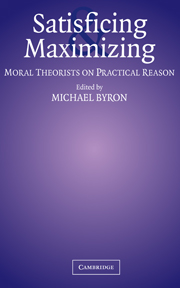Book contents
- Frontmatter
- Contents
- Contributors
- Introduction
- 1 Two Views of Satisficing
- 2 Satisficing as a Humanly Rational Strategy
- 3 Maxificing: Life on a Budget; or, If You Would Maximize, Then Satisfice!
- 4 Satisficing and Substantive Values
- 5 A New Defense of Satisficing
- 6 Satisficing: Not Good Enough
- 7 Why Ethical Satisficing Makes Sense and Rational Satisficing Doesn't
- 8 The Plausibility of Satisficing and the Role of Good in Ordinary Thought
- 9 Satisficing and Perfectionism in Virtue Ethics
- 10 Could Aristotle Satisfice?
- 11 How Do Economists Think About Rationality?
- Bibliography
- Index
1 - Two Views of Satisficing
Published online by Cambridge University Press: 04 December 2009
- Frontmatter
- Contents
- Contributors
- Introduction
- 1 Two Views of Satisficing
- 2 Satisficing as a Humanly Rational Strategy
- 3 Maxificing: Life on a Budget; or, If You Would Maximize, Then Satisfice!
- 4 Satisficing and Substantive Values
- 5 A New Defense of Satisficing
- 6 Satisficing: Not Good Enough
- 7 Why Ethical Satisficing Makes Sense and Rational Satisficing Doesn't
- 8 The Plausibility of Satisficing and the Role of Good in Ordinary Thought
- 9 Satisficing and Perfectionism in Virtue Ethics
- 10 Could Aristotle Satisfice?
- 11 How Do Economists Think About Rationality?
- Bibliography
- Index
Summary
The title of this essay should naturally put knowledgeable readers in mind of a certain kind of disagreement about the nature of (rational) satisficing. Many economists, philosophers, and others have held that satisficing makes sense only in relation to a larger overall maximizing or optimizing perspective, and on such a view it is rational to seek less than the best one can only if for example one is in circumstances where maximizing is impossible or where local satisficing is a means to overall optimality. For convenience, let us call this the instrumental conception of satisficing.
It is also possible to conceive satisficing as sometimes being non-instrumentally rational, as a form of decision making that is sometimes, as we can say, inherently or intrinsically rational. This has been and still is decidedly the minority view on the rationality involved in satisficing, but the disagreement between those who maintain that all rational satisficing is instrumental and those who maintain that satisficing can sometimes be rational on non-instrumental or intrinsic grounds has been an interesting feature of the recent philosophical landscape. That interestingness may well be one reason for the existence of the present book, but I don't propose to continue this particular debate in my contribution to this volume. In fact, I know of others who will be carrying it forward here, and I very much look forward to seeing what they have to say.
What I want to do here is consider a rather different distinction having to do with satisficing.
Information
- Type
- Chapter
- Information
- Satisficing and MaximizingMoral Theorists on Practical Reason, pp. 14 - 29Publisher: Cambridge University PressPrint publication year: 2004
Accessibility standard: Unknown
Why this information is here
This section outlines the accessibility features of this content - including support for screen readers, full keyboard navigation and high-contrast display options. This may not be relevant for you.Accessibility Information
- 7
- Cited by
